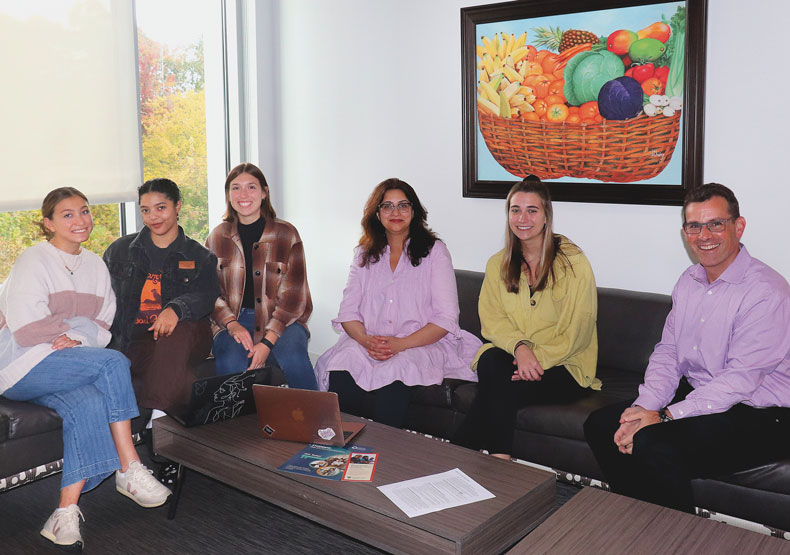Expanding and Strengthening the Mental Health Workforce in Schools

A $5.9 million-dollar grant—the largest in the history of William James College—will make a significant and immediate impact in public K-12 schools throughout the Commonwealth of Massachusetts.
Funded by the U.S. Department of Education, the Mental Health Service Professional (MHSP) Demonstration Grant Program will support the College’s ongoing efforts to build a diverse behavioral health workforce, recruit and train school psychologists and paraprofessionals to deliver trauma-informed and culturally responsive care to children and adolescents, and promote inclusive practices in high-need schools across the state.
 Upon the grant’s announcement in April, Jason Kaplan, PhD, chair of the School Psychology Department and project director of the MHSP Program stated, “We are grateful to the U.S. Department of Education for recognizing the
need to prepare professionals for mental health careers in our school systems. Given
the critical shortage of school psychologists, this 5-year grant will go a long way
in filling many positions across the state.”
Upon the grant’s announcement in April, Jason Kaplan, PhD, chair of the School Psychology Department and project director of the MHSP Program stated, “We are grateful to the U.S. Department of Education for recognizing the
need to prepare professionals for mental health careers in our school systems. Given
the critical shortage of school psychologists, this 5-year grant will go a long way
in filling many positions across the state.”
The National Association of School Psychologists (NASP) estimates that 1 in 5 school-age children experiences mental illness in a given year, but most do not receive adequate care. NASP recommends a ratio of 1 school psychologist per 500 students. The national ratio for the 2021-22 school year was 1 school psychologist to 1,127 students, a deficit of close to 56%. During the COVID-19 pandemic, mental health challenges among youth became more pronounced, with students experiencing higher rates of depression, anxiety, and suicide.
“It is particularly important to increase the number of school psychologists, especially given the statistic that of school-age children who receive mental health services, 70-80% receive them at school,” said Kaplan. “Given that children and adolescents spend a majority of their time in school, it is often the only accessible place for them to receive mental health support—especially those students who are from racially and ethnically minoritized backgrounds.”
Serving High-Need Communities
School-based mental health service providers play a critical role in promoting students’ positive mental health, social-emotional wellbeing, and academic performance. As an institution whose mission is to prepare professionals in psychological services to address the current and evolving behavioral health needs of an increasingly diverse and changing world, William James College (WJC) has partnered with nine public school districts to implement the MHSP Program. These districts were chosen for their aligned mission with the MHSP grant, their eagerness to be a part of the project, the diversity of their population, and vital resource gaps.
Beginning this year, graduate students from underrepresented communities—including first-generation students; individuals with disabilities; ethnic, linguistic, and racial minority groups; and LGBTQIA+-identifying individuals—and those who are committed to working as school psychologists and behavioral health counselors in high-need public school districts will receive scholarships and stipends through the MHSP Program. They will also complete their practicum and internship training in high-need schools where they, along with other mental health providers, teachers, and school personnel, will receive training from the WJC Center for Behavioral Health, Equity, and Leadership in Schools (BHELS) on culturally responsive and inclusive practices to foster safe learning environments. Additionally, through the grant, pathways will be opened for 100 paraprofessionals to pursue certifications and degrees at local community colleges and the WJC Bachelor of Science completion program in Psychology and Human Services. Continuous evaluation will ensure the project and participants are best serving children and adolescents in historically underserved communities.

Scholarship recipients (from left to right): Emilee Meltzer, Ashley Herrera Tejeda, Sheridan Tupper, Soraya Merchant, Geena Holdcraft, and Dr. Jason Kaplan.
Impacting People, Policy, and the Future
The MHSP grant builds upon two other sizeable federal grants awarded to the College that offer scholarships, stipends, and mentorship supports to students while working in the field. “William James College is fortunate to partner with, and receive continued funding from, the Health Resources and Services Administration to expand and diversify the behavioral health workforce,” said Gemima St. Louis, PhD, vice president for workforce initiatives and professor in the Clinical Psychology Department. “When we applied for the MHSP grant, we were confident in our ability to demonstrate that our College has the expertise, the appropriate faculty, and a strong track record of successfully managing similar federal programs,” St. Louis added. “We were optimistic, but it’s always a humbling experience when your institution is selected to lead such an innovative and timely initiative.”
Over the past few years, William James College has taken great steps to address the critical workforce shortages in the behavioral health field by implementing best practices for recruiting, training, and retaining students from culturally diverse backgrounds; developing career ladder programs for individuals who are underrepresented in the field; creating academic concentrations with a focus on underserved populations; and building sustainable partnerships with schools, community-based organizations, and state and federal agencies. The MHSP grant will further that commitment by increasing awareness of the mental health needs of youths in high-need school districts, effecting systemic change in policies and practices in K-12 schools, and training a diverse workforce of school psychologists and paraprofessionals to address the unmet mental health needs of students locally and nationally.
- Tags:
- Around Campus
Topics/Tags
Follow William James College
Media Contact
- Katie O'Hare
- Senior Director of Marketing
- katie_ohare@williamjames.edu
- 617-564-9389
